During this festive season the overwhelming urge to invite friends and family around to the house for dinner creeps up out of nowhere, much like the sharp biting winter chill of the season. The Audrey Herman Spotlighters Theatre reminds people everywhere why dinner guests are an atrocious idea, especially at this time of year with their zany and highly amusing production of George S. Kaufman and Moss Hart’s The Man Who Came to Dinner. Directed by Artistic Director Fuzz Roark, this scintillating holiday comedy is just what the season calls for to keep everyone on their toes and in stitches just in time for Christmas.
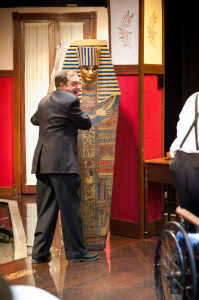
Taking the intimate square of Spotlighters’ stage back to rural, albeit aristocratic, 1939 Mesalia, Ohio falls to the shoulders of Resident Set Designer Alan Zemla. The rich red interior columns give the Stanley home a sense of warming welcome; a too-perfect ironic fit for just how thinly Mr. Whiteside wear his welcome once in residence. Zemla brings a homey sense of family into his scenic design work with exacting attention to detail whether it’s the antique-like family portraits on the walls or the way the way the clutter sits about the main living room once Mr. Whiteside has settled into the space. Zemla also presents the most impressive prop to ever traffic itself across the Spotlighters stage with his vibrant mummy’s tomb; a rare extravagance seldom witnessed in the intimate space.
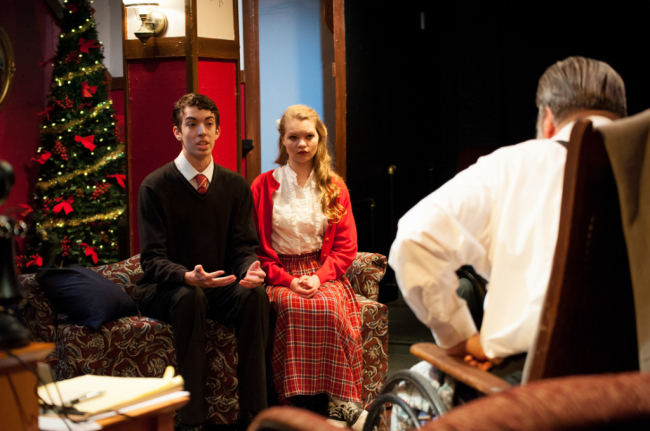
Honing in on the era, Resident Costume Designer Laura Nicholson dresses the cast to impress. The Stanley family are attired in garments that do the late 1930’s a great fashionable justice while subtly speaking of their slightly wealthy standing in society. Nicholson pulls out all the stops for the larger-than-life diva Lorraine Sheldon with outfits that practically pop off her person every time she enters the room. Even the ludicrous lace mourning gown, complete with a full-draped veil, for Harriet Stanley has a hint of fantastical design to it; completing the all-around absurdity of the play’s main situation.
While the pacing is exceptional for a show that pushes nearly three hours in length, there is a long and rather laborious scene change after the first scene that leaves the audience agonizing in darkness. A simple underscoring of a soundscape would easily disguise this transition and ease the momentum of the show more naturally along. Otherwise, Director Fuzz Roark keeps the scenes clipping along brilliantly. Entrances and exits following closely on the heels of one another as the characters swiftly navigate the roller coaster of calamity that ensues.
The opening scene alone is pulsing with movement; people coming and going like the Stanley household has become Grand Central Station. The carefully constructed chaos upon the tightly blocked and scenically laid stage is a testament to Roark’s ability to work the space to the show’s advantage; maximizing the comic potential of the script in the process. The performances delivered under Roark’s direction do Kauffman and Hart’s work a great service.
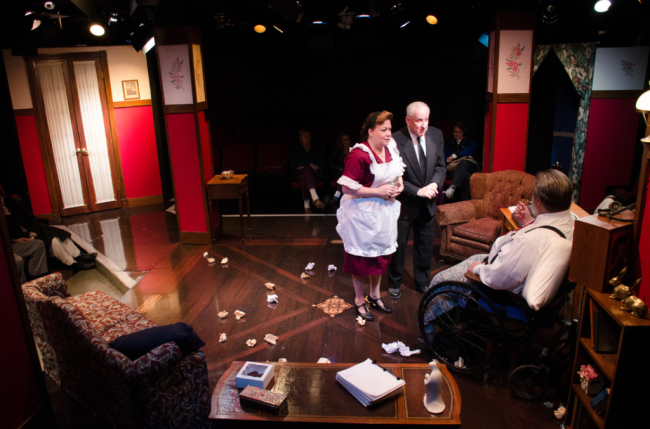
Populated with over two dozen characters the play calls on just 16 actors to deliver a plethora of wild and whacky personalities that keep the hilarity of this production perpetually elevated. Refreshing cameos, the result of which creates stolen scenes galore, include Glen Charlow as the curious Dr. Bradley, Chris Reber as the oddball Professor Metz, Dave Guy as the loyal servant John, and Melainie Eifert as the bubbly house cook Sarah. Charlow may only have a handful of lines but his painstakingly comical delivery of “I see you’re busy,” draws consistent laughter from the audience. Reber’s ridiculous accent creates an amusing caricature to add to the comic confusion of the plot. Eifert is perpetually perky and Guy delivers a few gestures and facial expressions that serve to enhance the overall comic experience.
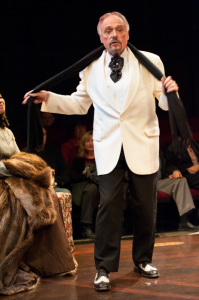
Dennis Binseel as Richard Stanley, the young son of the house, is a rejuvenating approach to congeniality. His touching moments shared with Mr. Whiteside, alongside those of June’s (Claire Iverson) really unearth the underlying tenderness in Whiteside’s character. For every tender character there is one who delivers exceptional comedy as well and in this case Banjo (Jason Vaughan) and Beverly (Greg Grenier). Though never appearing on stage together each delivers an uproarious scene stealing moment uniquely their own.
Vaughan arrives near the end of the play like a gust of unexpected wind on an otherwise clear day; blowing heartily with his mentally delinquent antics to keep all eyes on him. Grenier’s arrival is a touch more grandiose; a flamboyant flame swooping in with charm and affluence dripping from his very being like a popsicle melting in summertime. Flitting about the stage like a graceful, albeit wound-up, fruit bat, Grenier cracks the audience right up with his mocking imitations of Lord Bottomly.
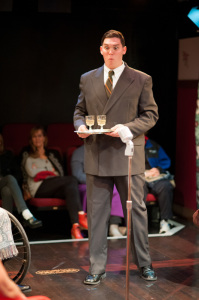
Genuine charm arrives in the form of Bert Jefferson (Eric Poch) an upstart newspaper man who is swell all around. Like a still life that stepped out of the Sunday evening post, Poch takes an otherwise generic gentleman and makes him lively. Particularly during his drunken engagements towards the end of the play, Poch delivers a dynamic performance consistently throughout. His clearly grounded focus even helps to anchor Maggie (Garima Bhatt) whose character feels too often out of place in the 1939 year of the play. Bhatt’s performance, while well spoken, smacks harshly of a modern woman and does not flow well with the rest of performances around her, particularly when it comes to interacting with the show’s principle character, Sheridan Whiteside.
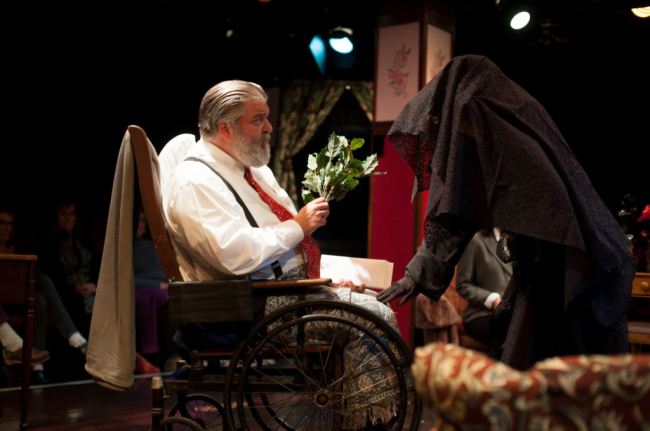
The meltdown moment that steals the show is delivered from the melodramatic Lorraine Sheldon (Caroline Kiebach.) Her tantrum scene on the telephone that results in a full blown histrionic fit is side-splittingly hysterical. Her over-the-top borderline ham performance as the vapid acting sensation is top notch though at times she races so quickly through what she’s saying she is difficult to understand. Kiebach doubles as the eccentric enigma Harriet Stanley and between her mysterious mincing walk and her curious gravelly voice she wins the hearts of the audience all over. Kiebach catches the attention of all whether she’s skulking about in the black lace as Harriet or strutting through the Stanley household like she owns the place.
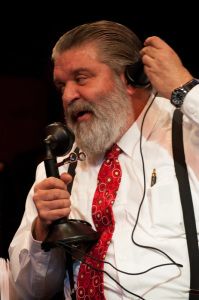
Sheridan Whiteside (Mike Galizia) is a personality to be reckoned with. Bellowing and belching insults from his wheelchair, Galizia livens up the stage every time he barks an order. Galizia delivers the character’s vicious verbal insults with vinegar vibrating off his tongue. Dripping with sarcasm, his rich Thurl Ravenscroft-like timbre delivers without exception in this role. But hurling insults is not all Galizia is capable of in the deeply dynamic role. When he starts in on the tale of the convicts’ prison the mesmerizing way in which he tells the story truly captivates everyone present. The multi-faceted emotional portrayal delivered by Galizia is stellar; perfection for the role as it was designed.
Skip the dinner invitations to family and friends this holiday season, and head to Spotlighters to see The Man Who Came To Dinner, it’ll be far more entertaining than any ordinary holiday invite.
Running Time: 2 hours and 50 minutes with two intermissions
The Man Who Came To Dinner plays through December 21, 2014 at The Audrey Herman Spotlighters Theatre— 817 N. Saint Paul Street, in Baltimore, MD. For tickets call the box office at (410) 752-1225, or purchase them online.

